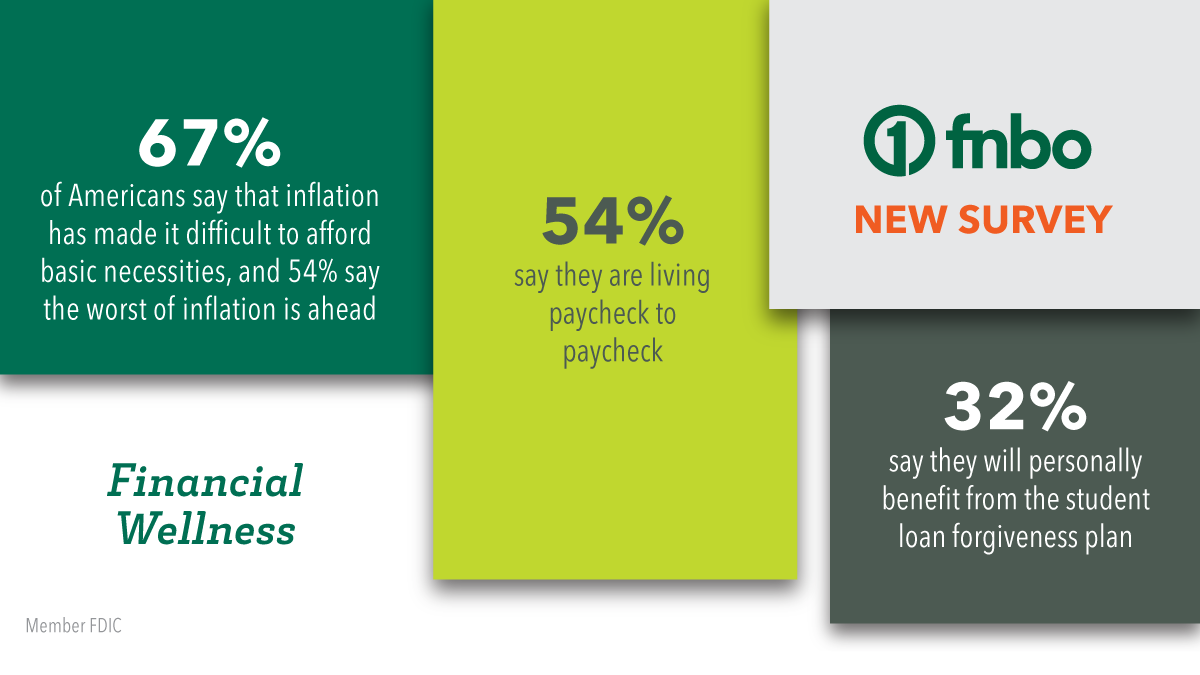FDIC-Insured - Backed by the full faith and credit of the U.S. Government
-
-
-
FNBO Newsroom
Date Published: November 14, 2022
-

Press Release
Release Date: November 14, 2022
Survey: 67% Of Americans Say That Inflation Has Made It Difficult to Afford Basic Necessities
FNBO Examines How Inflation, Student Loan Forgiveness and More Are Shaping the Personal Finance Landscape
OMAHA, Neb. November 14, 2022—First National Bank of Omaha (“FNBO”) today released the results of its 2022 Personal Finance Snapshot Survey. The latest in a series of consumer surveys by FNBO, the 2022 Personal Finance Snapshot Survey examines how our challenging economic times are shaping and impacting Americans’ financial behaviors, beliefs and situations.
“Consumers and their bank accounts are undoubtedly feeling the impact of inflation, and this will only be felt even stronger as we approach the holiday season. We encourage those struggling with their finances to reevaluate their budget to ensure it supports current and future financial goals, and if not, to adjust accordingly,” said Sean Baker, executive vice president, Individual Customer Segment, FNBO. “Regarding future goals, we continue to see that many Americans aren’t saving for retirement, which is a critical element of financial wellness, so we urge everyone to contribute what they can to their retirement funds.”
The survey found:
- RECESSION: 72% of Americans say the U.S. economy is going into a recession this year.
- INFLATION: 67% say that inflation has made it difficult to afford basic necessities, and 54% say the worst of inflation is ahead.
- MENTAL HEALTH: 62% say that following the stock market gives them anxiety.
- STUDENT LOANS: 32% say they will personally benefit from the student loan forgiveness plan.
- CRYPTOCURRENCY: 30% say they own at least some cryptocurrency.
- RETIREMENT: 35% of non-retired Americans say they have not begun saving for retirement.
- EMERGENCY SAVINGS: 54% say they are living paycheck to paycheck, and 46% say that they do not have an emergency fund worth at least three months of expenses.
- SPENDING, SAVING & INVESTING: Compared to 2021, 49% say they are spending more (versus 27% who say they are spending less); 32% are saving more (versus 38% who are saving less); and 21% are investing more (compared to 38% who are investing less).
This latest survey is a follow-up to FNBO’s Financial Wellness Survey, released earlier this year, which found that nearly half of Americans have less than $15,000 saved for retirement.
METHODOLOGY
This survey was conducted online using Survey Monkey among a national sample of 1,061 adults spanning across U.S. geographic regions and income levels. The survey sample was weighted to reflect the gender distribution and the age distribution across the 18-44 and 45+ age brackets in U.S. census data.
About First National Bank of Omaha (FNBO)
FNBO is a subsidiary of First National of Nebraska. First National of Nebraska and its affiliates have nearly $30 billion in assets and 5,000 employee associates. Primary banking offices are located in Nebraska, Colorado, Illinois, Iowa, Kansas, South Dakota, Texas and Wyoming. Learn more at FNBO.com and connect with us on Facebook, Twitter and Instagram.
The articles in this blog are for informational purposes only and not intended to provide specific advice or recommendations. When making decisions about your financial situation, consult a financial professional for advice. Articles are not regularly updated, and information may become outdated.
